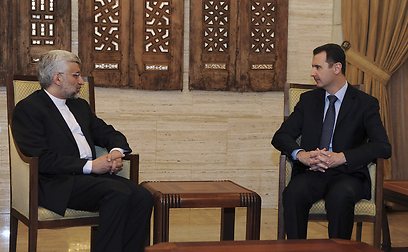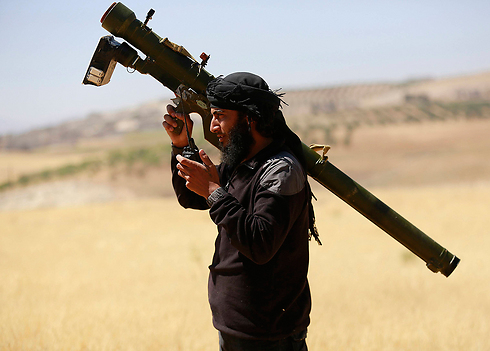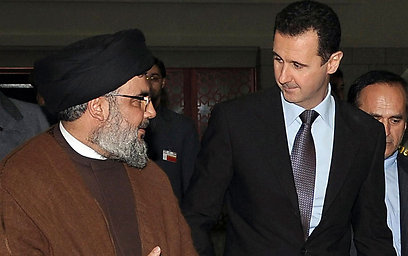
Increasing Russian, Iranian involvement helps Assad make great strides in Syria
Analysis: For the first time since the 80s, Russian consultants arrive in Syria to advise Assad's generals, while Tehran sends Iranian Guard soldiers to aide the Syrian president.
Ahead of the presidential elections in Syria next month, President Bashar Assad is making a considerable effort to regain control of areas of his country.
And, indeed, the Syrian regime has been recently successful, after years of battle, in seizing control of the key city Homs and the Qalamoun mountains area near the border with Lebanon, which provides Assad with a territorial link to Hezbollah-controlled areas in the Beqaa Valley.
On the other hand, Assad recently lost control of the Syrian Golan area that is bordering Israel, after the Syrian army's Brigade 60 crumbled under the pressure and abandoned its posts, including the brigade commander.
Assad's regime currently controls a narrow corridor leading to the deserted city of Quneitra and the city itself. Another corridor under Assad's control is from the Damascus area to the Druze villages in the Hadar area, where he has many supporters and where Hezbollah is also operating.
There are several reasons behind these achievements, among them the loyalty of the Syrian army to its president, and the fact the country's minorities are afraid of the radical Sunni Muslims. But Western intelligence believes that the main reason is an increasing involvement of Iran, Russia and Hezbollah in the civil war raging in Syria.
Arab media has recently quoted credible sources as saying that for the first time in over a decade, Russian consultants have been seen among Syrian army units in the midst of actual fighting. The Russian consultants aide the different units' commanders, all the way up to the battalion commanders level.
The Russian consultants are advising the Syrian commanders on fighting against guerrilla fighters; experience the Russians gained fighting in Afghanistan and more recently in Chechnya, where Muslim Jihadist fighters were involved, similar to those in Syria.
The Russian consultants are also aiding the Syrian army receive advanced weaponry arriving from Russia, as well as in collecting and processing intelligence.
Russian mercenaries are guarding the oil fields in eastern Syria, which are under Assad control.
Russian involvement in such a scale and in such intensity hasn't been seen in Syria since the 1980s.
The Russians are not alone. The Iranians, who have been continuously aiding the Assad regime, have become more directly involved in the fighting in Syria.
Tehran, according to Arab press reports and comments recently made by the Iranian Guard Corps commander, is now sending Iranian Guard fighters to Syria. Some 300 Iranian Guard soldiers are currently fighting in Syria, likely in Aleppo, where the Assad regime has encountered many difficulties.

While the Iranian Guard's involvement is new, Shi'ite militias recruited in Iraq and Iran by the Islamic Republic have been fighting in Syria long before the Iranian Guard Corps arrived.
The third player increasing its involvement in Syria is Hezbollah, whose men are operating both covertly and openly in the fighting in Syria.
The Syrian army's current assault on Daraa and Nawa in southern Syria, on the border with Jordan, is aided by hundreds of Hezbollah fighters.
The objective is to block the route for supplies and Jordanian reinforcement for the rebels controlling the area, who are mostly from the al-Nusra Front and other al-Qaeda-linked groups.
In this context it is important to note that the rebels controlling the Syrian Golan Heights are from secular or moderate Islamist groups, and that Israel has passed on a message to these groups that it would not tolerate the presence of the International Islamic Jihad, al-Nusra Front and other radical groups close to the border.
On the whole, it appears Assad's control of Syrian territories has slightly improved. He now controls the main cities, but has difficulties in the Damascus and Aleppo areas, as well as on the border area with Turkey.
The rebels' situation may not be good - they are fighting amongst themselves and are not getting the anti-aircraft weapons they've been begging Washington to give them - but Assad's chlorine gas attacks aren't deterromg them and they continue to fight.
It appears the war in Syria will continue for a while longer.












